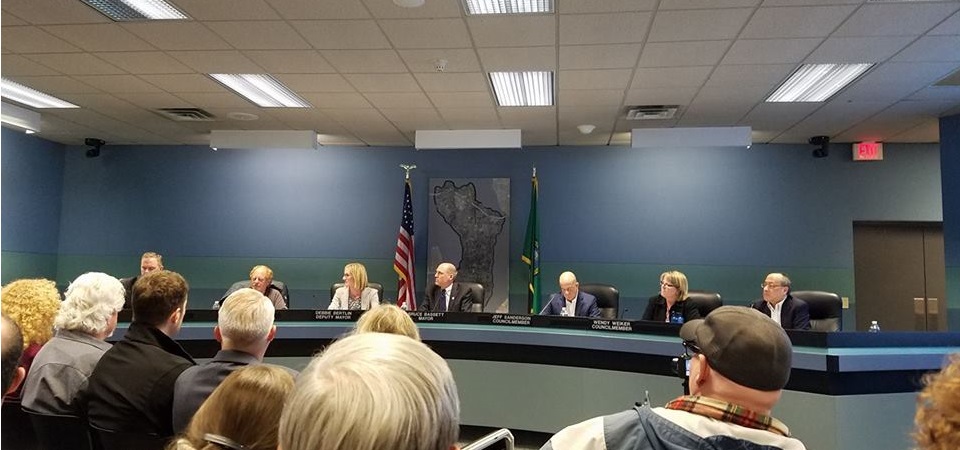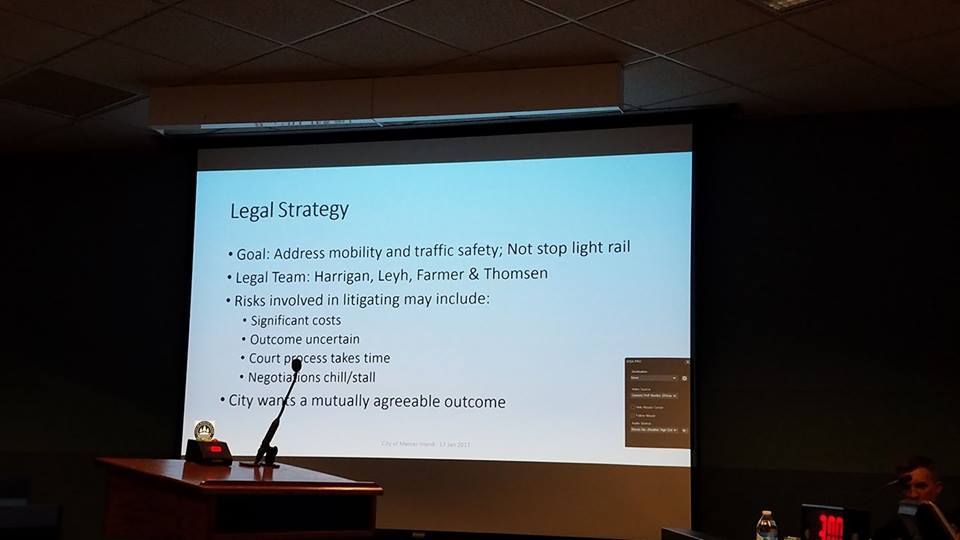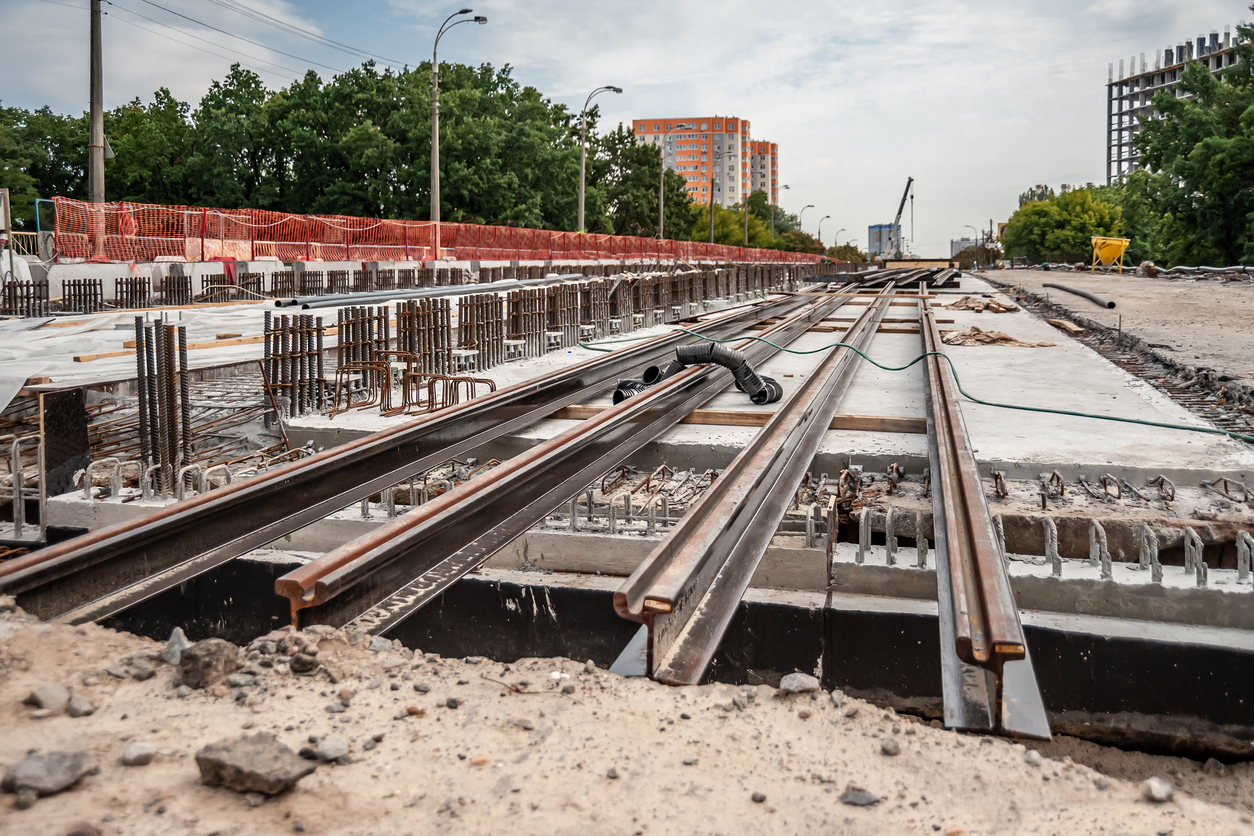Mercer Island City Council is suing Sound Transit for breach of contract

Yesterday, I attended and spoke at the Mercer Island City Council’s special meeting regarding the loss of mobility on I-90 due to Sound Transit’s construction of East Link.
The public turnout was impressive, with standing room only and a good amount of overflow. I was encouraged to see so many people there, taking the time to participate and share their views late into the evening.
The Mercer Island City Council voted unanimously to sue Sound Transit for breach of contract and to temporarily stop the closure of the I-90 center roadway. This would give all stakeholders more time to negotiate how they can better preserve mobility and safety for Mercer Island residents.
 Councilmember Wendy Weiker said it well: “It’s time to deploy the lawyers.”
Councilmember Wendy Weiker said it well: “It’s time to deploy the lawyers.”
Many people in the region seem to care very little for Mercer Islanders' needs. Yet residents, no matter where they live, or how much they earn, simply want their voice heard.
Here is the link to the video of the hearing. My public testimony (I was second in line) begins at 1:36:20. The text of my testimony is included below.
PUBLIC TESTIMONY - 2/13/2017
Mayor Basset, Councilmembers: My name is Mariya Frost and I am the Transportation Director at Washington Policy Center.
There are certainly many points of concern about this project, but I’d like to touch on the impact that the center roadway closure would have on traffic congestion and our freight industry, as we are the most freight dependent state in the nation.
In the East Link Final Environmental Impact Statement, Sound Transit cites that after I-5, I-90 is the second most heavily used highway for truck movements in Washington. In other words, it is the primary east/west corridor from Seattle to the eastern United States for passenger and freight vehicles. Needless to say, this isn’t just a Mercer Island issue.
Sound Transit’s own numbers show that very few people will use light rail as a percentage of the overall population, and thus freight does not benefit from light rail or the proposed configuration. Transit utilization has been proven to not reduce congestion in major urban centers. In fact, the East Link project will hurt throughput and increase congestion for anyone who doesn’t “choose” light rail, as Sound Transit suggests in the EIS. Many drivers, and truckers in particular, don’t have this choice at all, nor do truckers always have the choice to travel instead during off-peak hours as gridlock gets worse, because customers and just-in-time deliveries increasingly dictate travel times.
According to the Federal Highway Administration, national freight demand is expected to grow 89% by 2035. If the center roadway is closed and light rail is placed on I-90, during the morning peak drive, the number of freight trucks able to cross into Seattle would drop 24%. Leaving during the afternoon peak drive, trucks would see a 19% reduction. Delays can cost each truck at least $63 an hour. If this project moves forward, by 2030, increases in congestion will cost the commercial trucking industry millions more than they would if Sound Transit did nothing, and will ultimately increase costs of products and services to consumers.
The HOV lanes will not alleviate this problem, and will artificially restrict roadways in an area where trucks need the ability to change lanes safely. WSDOT and Sound Transit, in their insistence on HOV lanes without any regard for whether they’re necessary or not, are going to impact operations and safety on the bridge. If they want trucks (and people in general) to be able to safely use the I-90 corridor, they must get rid of HOV lanes west of Mercer Island and have four general purpose lanes each way to allow for safe lane changes.
It also seems Sound Transit officials don’t want the public to be able to access both the center roadway and future HOV lanes at the same time because this would demonstrate that creating additional capacity is effective in reducing congestion. This apparent political maneuvering with regard to HOV lanes only perpetuates the public’s skepticism.
In conclusion, Washington Policy Center advocates strongly for implementation of real capacity improvements between the eastside and Seattle. If Sound Transit and WSDOT insist on moving this forward, they need to come up with another option for the right-of-way of the light rail line.
Thank you again for your time, and thank you to Mercer Islanders for your engagement in challenging a project that has serious implications for the region and for our entire state.






